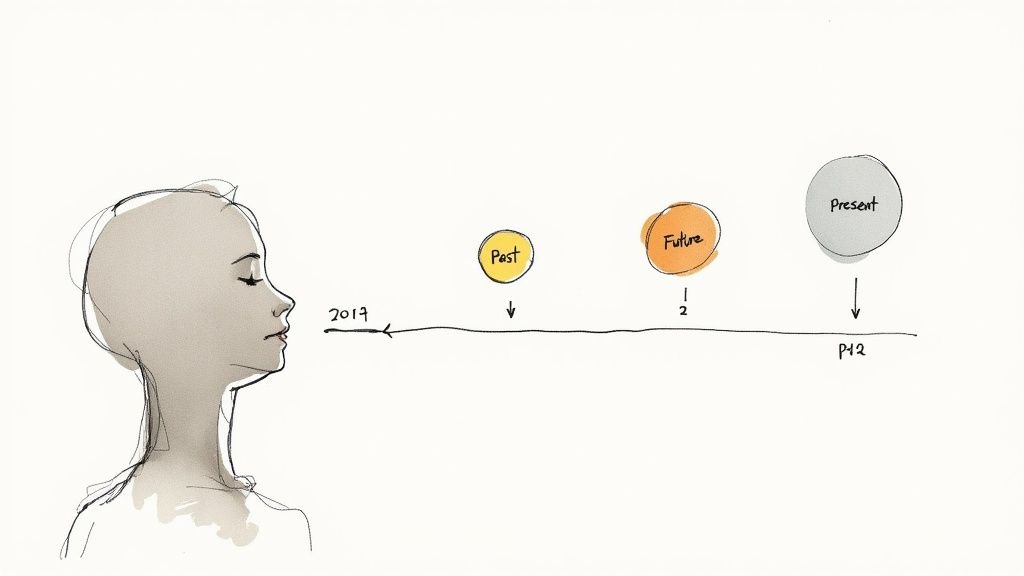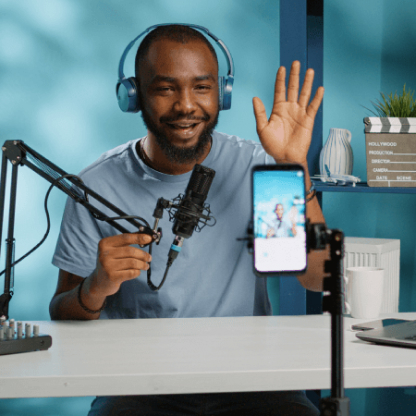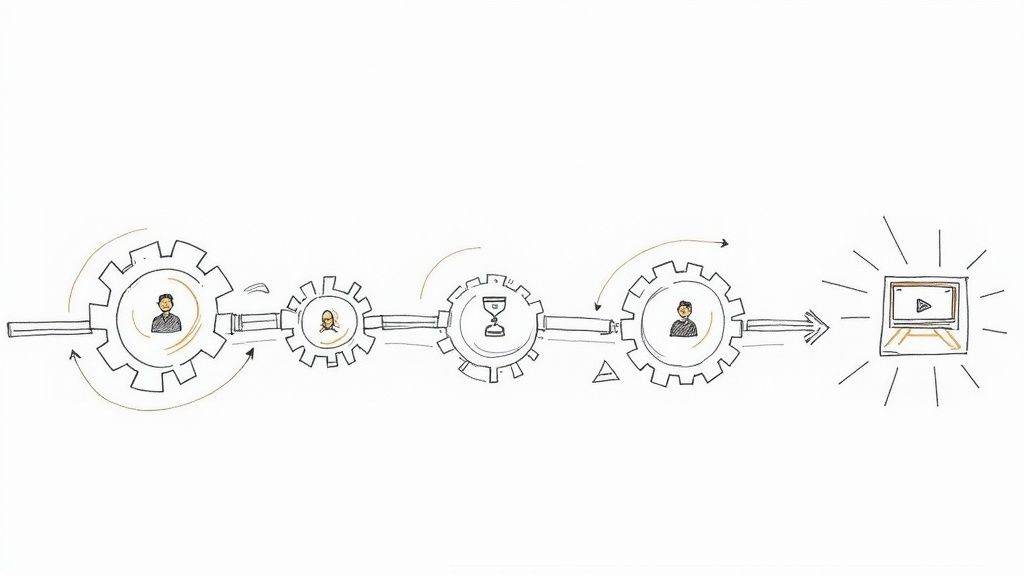Let's be real. Screening candidates is a second full-time job you didn't ask for. You're swimming in resumes that all claim to be "results-oriented team players," and your calendar looks like a graveyard of 30-minute calls that went nowhere. The whole point of pre-recorded video interviews was to save us from this mess. But what good is the fancy tech if you’re asking questions a chatbot could answer? "What's your biggest weakness?" Seriously?
I've been in the trenches, building teams from the ground up, and I've wasted more time on bad screening calls than I care to admit. Turns out, the magic isn't in the platform; it's in the questions. This isn't another generic HR blog post. This is a founder's playbook for the 6 pre recorded video interview questions that actually peel back the resume and show you who you’re dealing with. We’ll break down why they work, what to look for, and how to spot the red flags before you ever waste a Calendly invite.
And yes, you should also be weaving in specific cultural fit interview questions, but let's first nail the fundamentals that separate the contenders from the pretenders.
1. Tell Me About Yourself
Right, the classic opener. The OG of interview questions. You’ve asked it a million times. But in a pre-recorded interview, this isn't a gentle warm-up. It's a high-stakes, one-take test of a candidate's ability to communicate, project confidence, and think on their feet without you there to nod along.
This one question immediately separates the pros from the rookies. Did they deliver a crisp, 60-second pitch connecting their story to your role, or did they ramble about their summer job in college? You’ve just learned more about their preparation and professionalism than a dozen bullet points could ever tell you. It's your first, and frankly, most ruthless filter.

Strategic Breakdown
So, why does this simple question hit so hard in an async format? It forces candidates to craft a compelling story without any feedback. No friendly smiles, no "tell me more about that." Just them and a camera. This is where you see who can truly own a room.
- Communication & Clarity: Can they actually structure a thought? Their answer is a live demo of how they’ll communicate in Slack, team meetings, and client emails.
- Relevance & Prioritization: Do they get what this role is really about? A tailored pitch shows they did their homework. A generic one shows they’re just spamming the "Apply" button.
- Self-Awareness: How do they frame their own career? The highlights they choose reveal what they believe their biggest value-add is.
When and Why to Use It
Always. Opener. No exceptions. This sets the baseline. If a candidate botches the most predictable question in the playbook, how are they going to handle the curveballs you throw later? It’s a massive red flag.
Key Takeaway: Think of this as a "soft skills" stress test. You're not checking their resume (you already have that); you're checking their ability to sell their own value proposition.
There's a reason platforms like HireVue and Spark Hire make this a default question. It’s brutally efficient. Consulting firms like Deloitte use it to weed out thousands of campus applicants with identical GPAs to see who actually has presence. Want to know what the other side is coached to do? Check out these pre-recorded video interview tips. Knowing their playbook helps you see through the rehearsed answers.
2. Describe a Challenge You Overcame at Work
If "Tell me about yourself" is the handshake, this question is where you ask to see their calluses. You’re not looking for a sob story. You're asking for a blueprint of their problem-solving brain. In a pre-recorded video, this is your secret window into how they act when the Wi-Fi is down, the client is yelling, and the deadline was yesterday.
This is the moment the talkers get separated from the doers. The candidate who gives a vague answer about a "tricky project" gets deleted. The one who crisply walks you through the STAR method (Situation, Task, Action, Result) for a genuine crisis? You just found someone with grit. It’s a direct measure of their ability to own a problem and narrate a solution without you holding their hand.

Strategic Breakdown
What makes this behavioral question so powerful when it’s just them and a camera? It forces them to prove, not just claim, their skills. You’re getting a recorded deposition of their competence under fire.
- Problem-Solving & Critical Thinking: Can they actually diagnose an issue and execute a plan? Their story reveals their real-world thought process, not just the theory.
- Resilience & Accountability: Do they blame their old boss, or do they own their part in the chaos? This uncovers their professional maturity in one clean shot.
- Impact & Results-Orientation: Did what they do actually matter? A strong answer ends with a number—money saved, time cut, revenue gained.
When and Why to Use It
Use this right after the opener. Once you know they can talk, find out if they can do. It's a must-have for any role that isn't just following a script. If a candidate can't recall a single meaningful challenge they've conquered, they're not ready for the real world.
Key Takeaway: Think of this as a "competency simulator." You're not just hearing about skills; you're watching a replay of those skills in action.
Amazon has practically built its entire hiring process around behavioral questions like this one (they call it "Leadership Principles"). It’s a ruthlessly effective way to see if past performance is a reliable predictor of future success. To see how top-tier candidates frame these stories, read up on tackling workplace issues with grace. It’s like getting a peek at the other team’s strategy.
3. Why Do You Want This Position/Company?
This question isn't a formality; it's a loyalty test. If the first question was the handshake, this one is where you find out if they're looking for a long-term relationship or just a one-night stand. It’s your best weapon for weeding out the spray-and-pray applicants who probably applied to your competitor 10 minutes ago.
In a pre-recorded format, this becomes a powerful BS detector. A candidate who mumbles about "growth opportunities" clearly spent two minutes on your homepage. The one who geeks out about a recent feature launch or connects their values to your mission statement? That person wants this job, not just any job.

Strategic Breakdown
This question forces candidates to prove their interest without the safety net of an interviewer to guide them. Their answer reveals their "why," and it shows you exactly how much homework they’re willing to do before they even get an offer.
- Motivation & Passion: Does their energy level change when they talk about your company, or do they sound like they’re reading a book report? You’re listening for a spark of genuine excitement.
- Cultural & Value Alignment: Their answer shows what they think you care about. If they gush about your ping-pong table but you're a heads-down, mission-driven team, that’s a mismatch.
- Research Skills & Preparation: Did they just skim the "About Us" page, or did they read your last quarterly report? This separates the truly invested from the merely interested.
When and Why to Use It
Hit them with this early, right after the intro. A strong answer here makes all their other answers more believable. A weak one makes you question their entire application. It’s a go/no-go question for assessing long-term fit.
Key Takeaway: Treat this as a "commitment gauge." It measures how invested they are in your opportunity, not just their need for a new logo on their LinkedIn profile.
Companies with cult-like followings like Netflix live and die by this question to protect their culture. They need true believers. Startups use it to find people who are obsessed with the problem they’re solving, not just chasing an exit. It’s one of the most efficient pre recorded video interview questions for filtering out the low-intent crowd.
4. Describe Your Greatest Professional Achievement
This isn't an invitation to brag. It’s a diagnostic tool. When you ask about their greatest achievement, you’re not just asking what they did. You’re asking them to define what "great" means, to prove they can quantify their impact, and to show you they know the difference between being busy and being effective.
A great answer isn't about the budget of the project. It’s about their ability to articulate the why, the how, and the so what. The candidate who can clearly explain how they grew a key metric by 30% is a world apart from the one who vaguely mentions "leading a successful project." You're looking for someone who thinks in terms of results.

Strategic Breakdown
In a pre-recorded interview, this question is a goldmine. The candidate is on their own, forced to build a case for their own excellence. It's a test of both their past performance and their present storytelling ability.
- Impact & Results-Orientation: Do they speak in dollars, percentages, and metrics? This tells you if they’re wired to drive business value or just check off tasks. Sales leaders love this one.
- Problem-Solving Skills: How did they get there? A killer answer details the roadblocks, the strategy they deployed, and the specific actions they took. It’s a blueprint of how they think.
- Ownership & Accountability: Listen to their pronouns. Is it all "I, I, I," or do they give credit where it's due? This is a subtle but powerful indicator of leadership potential.
When and Why to Use It
Use this after the warm-ups. Once you’ve established their basic communication skills, this is your first real dive into their track record. It’s essential for any role where performance isn't subjective—sales, marketing, engineering, you name it.
Tech giants like Google use performance-based questions like this because they know past behavior is the best predictor of future behavior. Don't ask what they would do; ask what they did.
Key Takeaway: This question forces candidates to bring receipts. It moves the conversation from hypothetical skills to a concrete, quantifiable win they put on the board.
5. How Do You Handle Stress and Pressure?
Alright, this is where you find out who’s durable and who’s going to crumble. In a pre-recorded interview, asking about stress isn't some fluffy HR question. It's a clever way to see how they react to pressure in real-time—the pressure of a blinking red light and a countdown timer.
Anyone can type "works well under pressure" on a resume. This question forces them to show you their playbook. A candidate who gives a cliché answer about "taking deep breaths" is hiding something. The one who details a specific, structured system for prioritizing tasks during a crisis? That's someone you can rely on when things go sideways.
Strategic Breakdown
Why does this work so well in an async interview? It puts their emotional intelligence right under the microscope. Their answer is a direct look at their internal operating system for managing chaos.
- Resilience & Coping Mechanisms: Do they have a healthy strategy for dealing with chaos, or do they just "grind harder" until they burn out? You're screening for long-term sustainability.
- Self-Awareness: Can they even identify what stresses them out? Acknowledging triggers is the first step to managing them. It shows maturity.
- Problem-Solving Approach: Does their answer focus on the feeling of stress or on the actions they take to mitigate it? You want solution-oriented people, not complainers.
When and Why to Use It
This is a non-negotiable for any high-stakes role. Sales, customer support, project management—if deadlines and angry clients are part of the job, you need to ask this. It's your best shot at predicting who will keep a cool head when things inevitably catch on fire.
Key Takeaway: You’re not looking for someone who never feels stress. You’re looking for someone who has a battle-tested plan for it. You're hiring a prepared professional, not a robot.
High-pressure industries live by this question. Wall Street firms use it to find traders who won't panic-sell. Hospitals use it to find nurses who can handle a code blue with grace. To see how candidates are coached to ace this, check out guides on how to prepare for a video interview. It helps you spot the authentic answers from the rehearsed ones.
6. Where Do You See Yourself in 5 Years?
Yes, the dreaded five-year plan question. It feels like a trap because it often is. But in a pre-recorded format, this isn't about cornering a candidate. It’s a powerful filter for ambition, realism, and—most importantly—alignment. You're not just filling a seat for today; you're making an investment.
This is where you find out if they’re building a career or just collecting a paycheck. A generic answer about "growing with the company" is a non-answer. But a candidate who can connect their personal five-year plan to your company's known growth trajectory? That’s someone who sees a future with you, not just a stepping stone.
Strategic Breakdown
In an async format, this question forces a raw, unfiltered look at their life goals. Is your company a destination on that map, or just a gas station?
- Ambition & Realism: Is their plan grounded, or do they expect to be CEO in three years? This reveals their understanding of how careers actually work.
- Company Alignment: Did they bother to look up your company’s trajectory or typical career paths? A great answer shows they’ve thought about how their growth supports your growth.
- Retention Forecast: This is your crystal ball. A candidate whose goals have nothing to do with the opportunities you can offer is a flight risk. You’re just funding their next chapter somewhere else.
When and Why to Use It
Save this for the end. Once you've covered skills and experience, this question puts it all into a bigger context. It’s crucial for roles where you expect to groom future leaders. Consulting firms use it to see who has partner potential; tech companies use it to spot future VPs.
Key Takeaway: This question isn't about holding them to a plan. It's about seeing if they have a plan and if that plan has a parking spot in your company's future.
Platforms like VidCruiter see this used constantly to gauge that long-term cultural fit. A big bank wants to know if you want to climb their ladder, not use their training to launch your own fintech startup. It’s a brutally honest way to check for aligned incentives.
Pre-Recorded Video Interview Questions Comparison
| Question | Implementation Complexity 🔄 | Resource Requirements ⚡ | Expected Outcomes 📊 | Ideal Use Cases 💡 | Key Advantages ⭐ |
|---|---|---|---|---|---|
| Tell Me About Yourself | Low – open-ended, concise setup | Minimal – time-limited recording | Insight into communication skills and self-awareness | Initial icebreaker, broad candidate screening | Easy to evaluate; allows personal narrative |
| Describe a Challenge You Overcame | Moderate – requires STAR method preparation | Moderate – detailed response time | Demonstrates problem-solving, resilience, and growth | Behavioral assessment, problem-solving roles | Reveals maturity; concrete examples |
| Why Do You Want This Position? | Low – straightforward motivational question | Low – focused research needed | Assesses cultural fit and genuine interest | Cultural fit, motivation screening | Filters motivated candidates; shows company knowledge |
| Describe Your Greatest Achievement | Moderate – requires reflection and metrics | Moderate – candidate preparation | Highlights impact, leadership, and results orientation | Performance-driven roles, leadership positions | Showcases confidence and measurable success |
| How Do You Handle Stress & Pressure | Moderate – requires emotional insight | Moderate – situational examples | Evaluates resilience, emotional intelligence | High-stress roles (finance, healthcare, emergency) | Identifies coping strategies; predicts stress tolerance |
| Where Do You See Yourself in 5 Years? | Low to moderate – requires future planning | Low – introspective but simple | Assesses ambition, alignment, and long-term fit | Career path alignment, succession planning | Reveals ambition; indicates retention potential |
Stop Interviewing, Start Hiring.
So there you have it. You're no longer just armed with a list of pre recorded video interview questions. You have a strategic framework for digging past the buzzwords and seeing the real person. From the foundational handshake to the five-year forecast, you now know why these questions cut through the noise.
The goal was never to give you a script to read. It was to give you a toolkit for unlocking genuine insight. You’re not trying to trick candidates; you’re giving the right ones a stage to prove they belong on your team. You’re looking for potential, not just polish.
The Real Win: Efficiency and Insight
Let's face it: the old way of screening is a dumpster fire. It’s a black hole of scheduling emails, no-shows, and repetitive calls that tell you nothing. A smart asynchronous interview process isn’t just a nice-to-have; it’s a competitive advantage.
This is about more than just getting your calendar back (though, toot toot, that’s a huge win). It’s about making smarter, faster, and less biased decisions. It’s about giving every candidate the exact same shot to make their case. This is a perfect example of how business process automation doesn't just cut grunt work—it elevates the quality of your entire hiring pipeline.
From Questions to Qualified Candidates
The magic of these questions is what they reveal beyond the resume:
- You'll identify storytellers: Can they connect the dots between their past and your future?
- You'll find problem-solvers: Do they focus on solutions, or are they just narrating problems?
- You'll spot true motivation: Are they here for the mission or just for the money?
By standardizing your first-pass questions, you create a level playing field. You can finally compare candidates apples-to-apples. You're no longer just reacting to whoever lands in your inbox; you’re proactively building the exact team you need to win.
Ready to put these questions into action and reclaim your hiring process? Async Interview was built to make this entire process seamless, from sending invites to reviewing responses with your team. Stop drowning in scheduling links and start building your team 10x faster with the insights that matter.





